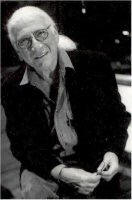In Remembrance: Jerry Goldsmith
 Jerry Goldsmith, the film composer who won an Oscar for his score for The
Omen, has passed away on Wednesday July 21, 2004 in Beverly Hills, California. He was 75.
Jerry Goldsmith, the film composer who won an Oscar for his score for The
Omen, has passed away on Wednesday July 21, 2004 in Beverly Hills, California. He was 75.
Born Jerrald Goldsmith on February 10, 1929 in Los Angeles, Goldsmith began music studies at 6. He studied piano with Jacob Gimpel and composition with Mario Castelnuovo-Tedesco. At the University of Southern California he attended classes in film composition taught by Miklos Rozsa, the Hollywood composer who won three Academy Awards (for his scores for Spellbound (1945), A Double Life (1947) and Ben-Hur (1959)), though probably best remembered for composing the instantly recognizable theme to the TV series Dragnet.
In 1950 Goldsmith landed a job in the CBS radio network’s music department as a clerk typist. He soon started landing assignments to score incidental music for such radio series as CBS Radio Workshop and Romance. Goldsmith stayed with CBS for ten years, eventually moving over to television and work on such series as Climax!, Gunsmoke, Have Gun, Will Travel, Wagon Train, Perry Mason and The Twilight Zone. During this time he also composed his first work for film, the 1952 thriller Don’t Bother To Knock, though he went uncredited. Goldsmith also scored Black Patch (1957), City Of Fear and Face Of A Fugitive (both 1959).
In 1960 Revue Studios hired Goldsmith for their Thriller series featuring Boris Karloff. There he met nine-time Oscar winning composer Alfred Newman who secured him the job scoring his first major film Lonely Are the Brave (1962). After his success with that film, he found himself composing more for the big screen than the small.
Goldsmith’s work distinguishes itself in that it ranges across many differing styles and influences. His somber score for the 1966 film The Blue Max is totally different from the mod melodies of the spy spoofs Our Man Flint (1966) and In Like Flint (1967). The main theme he composed for the television series The Waltons evokes a certain feeling of wholesome Americana while the wailing trumpet of his score for Chinatown (1974) set the mood for a dark, tragic tale of greed and corruption, though both projects take place in roughly the same time period.
Goldsmith was not averse to taking risks with his composition. For his ground-breaking and Oscar nominated percussive score to 1968’s Planet Of The Apes, he used horns blown without their mouthpieces and a bass clarinet that only had the notes fingered on its keys without the musician blowing through the instrument.
Goldsmith was nominated 17 times for an Academy Award for his work on the films Freud (1962), A Patch Of Blue (1965), The Sand Pebbles (1966), Planet Of The Apes, Patton (1970), Papillion (1973), Chinatown, The Wind And The Lion (1975), The Omen (1976), The Boys From Brazil (1978), Star Trek: The Motion Picture (1979), Poltergeist (1982), Under Fire (1983), Hoosiers (1986), Basic Instinct (1992), LA Confidential (1997) and Mulan (1999). He would only win for The Omen. He won five Emmy Awards for his television work and was nominated nine times for Golden Globes.
Despite the accolades he earned, there are two famous incidences where film directors rejected his music. In 1985 Ridley Scott removed Goldsmith’s score from the American release of the fantasy Legend, replacing it with New Age-ish compositions supplied by the band Tangerine Dream. Goldsmith’s score remained on the European release of the film, which also contained a variety of different scene selections and edits. Many fans who have seen both versions of the film have expressed a preference for Goldsmith’s score. More recently, Goldsmith and director Richard Donner could not agree on the music for the action film Timeline (2003).
Goldsmith’s last completed score was for the comedy Looney Tunes: Back In Action (2003), where he recreated the style of music heard in the classic Warner Brothers Bugs Bunny and Daffy Duck cartoon shorts.